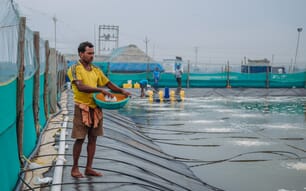
© Benchmark Genetics
Co-infection of EHP and specific bacteria like Vibrios has been identified as a major contributor to WFS, leading to stunted shrimp growth and significant financial losses for farmers.
The study, which has been published in the Journal of Aquaculture and was undertaken by Benchmark Genetics through a challenge test on shrimp from its breeding programme in Colombia, identifies moderate heritability for resistance to co-infection, underscoring the potential for selective breeding to bolster shrimp health and resilience against these diseases.
Other key findings from the study include:
- Disease resistance and shrimp growth showed no significant negative genetic correlation, allowing for simultaneous improvements in both traits.
- Genomic selection, as opposed to traditional pedigree-based selection, proved more accurate and effective in predicting shrimp resistance.
- Resistance is influenced by multiple genes with small effects, validating the use of genomic selection.
Benchmark Genetics says it has already implemented these findings into practice, applying genomic selection in its breeding programme to produce shrimp lines with improved resistance to co-infection by EHP and WFS.
The company anticipates the following benefits:
- Disease-resistant shrimp will reduce economic losses and cut treatment and disease management costs, improving farmers' overall profitability.
- Farmers can expect healthier, faster-growing shrimp, bolstered by advanced genomic selection strategies.
- Enhancing disease resistance through genetics will lead to more stable and resilient shrimp farming, reducing dependency on chemicals and antibiotics.
- By decreasing the need for antibiotics and other treatments, these innovations align with the industry’s move toward more sustainable, eco-friendly farming practices.
“We are thrilled to share our research findings with the aquaculture community,” said Carlos Lozano from Benchmark Genetics in a press release. “This study reinforces our commitment to pioneering genetics-based solutions and highlights our dedication to enhancing both the economic and environmental sustainability of shrimp farming worldwide.”



